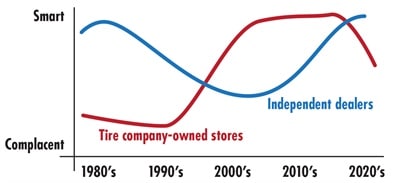
It seems like every issue of Modern Tire Dealer has an announcement of a new acquisition by Monro Inc., Icahn Automotive Group LLC, Bridgestone Americas Inc. and the like. One would assume by reading these that what I call the company-owned conglomerates are “winning the war” for the hearts and minds of consumers, but I would disagree. I think tire dealers are winning right now.
First, let me define winning. I was taught there are three metrics that matter most in the retail tire business: sales, profits and customer retention. As long as the stores were improving in those three metrics, life was good. So let’s analyze and compare the company-owned store operations to independent tire dealers.
Dealers are winning at sales. Two former clients of mine comprising 15- and 19- store chains averaged around $2 million in annual sales per store. Through published reports and articles I also found the following averages per outlet: Robertson Tire Co. Inc. in Oklahoma averages $1.7 million in its 14 stores; Tireman Auto Service Centers Ltd. in Ohio averages $2.5 million in its 20 stores; Dobbs Tire & Auto Centers Inc. in Missouri averages $2.75 million in its 40 stores; Belle Tire Distributors Inc. in Michigan averages $3.2 million in its 109 stores; and Les Schwab Tire Centers Inc. in Oregon averages $4.5 million in its 421 stores.
Now let’s look at the conglomerates. I estimate Bridgestone’s average annual per store sales are $1.4 million (Goodyear stores are likely about the same). Monro, a chain of 1,181 company-operated tire and muffler stores and 97 franchised locations, averages $957,000 per store. I estimate Pep Boys — Manny, Moe & Jack tire and service centers average around $900,000 each. Just not as good from my perspective. Whether it’s because independent dealers are that much better or that the company-owned stores over-saturate a market (therefore lowering their averages), who knows? It’s likely related to the fact that tire dealer-owners care more and are closer to their businesses. Even within a large independent tire dealer like TBC, I’m betting that franchisee-owners of Big O have higher sales volumes than the NTB stores.
Both independent dealers and company-owned dealerships are growing their store counts, and thus overall sales. But independent dealers are profitably expanding into new areas (perhaps pulled by customer demand?), while company-owned outlets are buying their way in. Big difference.
Who is winning on profits? The market leader in profitability has consistently been Monro. For the last three years running, its operating income as a percent to sales has been running at close to 12% and its EBITDA as a percent to sales is 15% or higher. Although Monro’s per store sales average is about $957,000, the company has a way of achieving about $150,000 in annual EBITDA per store by controlling payroll, benchmarking profit margins, excelling at distribution and controlling outside purchases. If Monro is the market leader, then everyone else is not doing as well. The Bridgestone store organization, with all of its field personnel changes the last 5 years, bottomed out and is finally on an upswing after several down years. Icahn Automotive is operating at a loss.
How do independent dealers stack up on profits? If the business is not run like a private piggy bank, and if the owner is vital, active and excited about the business, I find that independent dealers are doing as well if not better than Monro. Some are averaging $150,000 to $200,000 EBITDA and more per store.
In the retail tire business, payroll, rent and marketing are the largest expense categories. Dealers I know manage these expenses better and have lower advertising expenses by keeping existing customers while attracting new ones with innovative and targeted marketing.
Dealers are winning at customer retention. Keeping a store team stable and productive is one of the best customer retention strategies that you can have. And customer retention is directly related to profits. If stores churn through customers, their customer acquisition (marketing) costs are bound to be higher than independent dealers.
Note my graphic representation of the last four decades. It shows that there are cycles in this business when either Bridgestone and Goodyear stores or independent dealers are comparatively up or down.
In the eighties — in the spirit of full disclosure I worked at Firestone Tire & Rubber Co. from 1982-86 — the independent dealers were on top and the tire company-owned stores were shedding locations to loyal dealers. In the nineties, when I was working for Bridgestone, I saw that start to shift as dealers got complacent and the stores got smarter. I think that peaked in middle of this decade, and the independent dealers are the leaders once again.
Just because independent dealers are winning now does not mean they will win in the long run. Company-owned stores have some key strengths such as brand awareness, financial strength, access to cheap capital, and leverage that comes from having a national footprint.
Over the long run, the stronger balance sheets will win.
Michael McGregor is a veteran of the tire and service industry and a partner at FOCUS Investment Banking LLC. Contact him at [email protected].
This article was previously published at Modern Tire Dealer.














